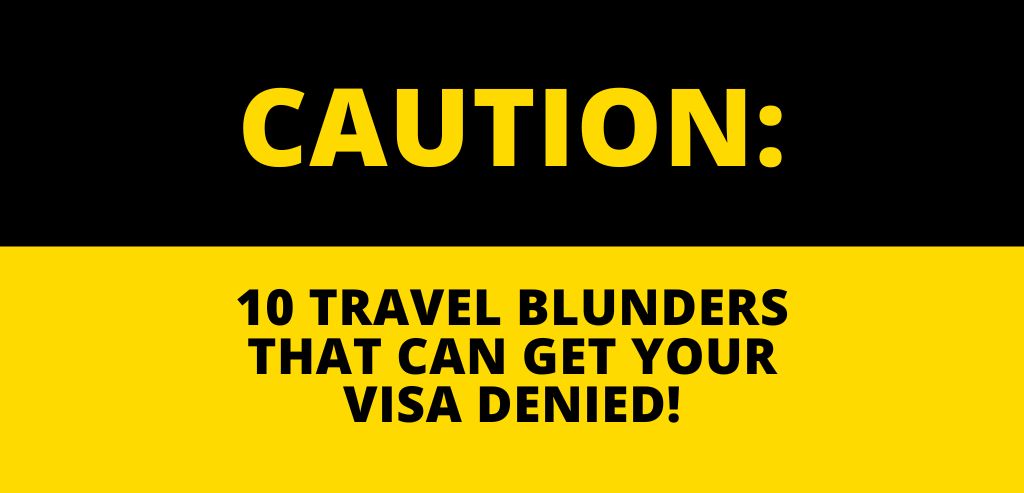Travelling the world is exciting, but visa applications can be daunting. Understanding the common reasons for visa rejection can help you avoid pitfalls and increase your chances of approval. This article explores the top 10 reasons visas get rejected, giving you the knowledge to navigate the process confidently.
Receiving a visa rejection can be a significant setback for travellers eagerly anticipating their adventures abroad. Despite meticulous planning and high hopes, visa rejections are a reality that many face.
Numerous factors can lead to a visa application being denied, from incomplete documentation to inadequate financial proof. Understanding the common reasons for rejection can significantly increase your chances of visa approval.
Top 10 Reasons Why Visas Get Rejected
This article dives into the top 10 pitfalls that can snag your visa application so you can confidently navigate the process.
1. Missing Paperwork or Mistakes: Don’t Wing It!
Visa applications involve a variety of documents, from passports and photos to financial statements and itineraries. Failing to submit everything required or providing inaccurate information is a recipe for rejection. Double-check deadlines, ensure all forms are complete, and meet specific format requirements (like photo size).
2. Light on Funds? Prove You Can Afford Your Trip
Many countries want proof that you have sufficient funds to cover your stay. This includes accommodation, food, transportation, and any planned activities. If your bank account looks like a barren wasteland, or the source of your funds seems suspicious, your visa might be denied.
3. The Well-Traveled Applicant: Building Your Travel Credibility
Some countries view a history of responsible international travel as a sign that you’ll respect visa rules and return home on schedule. A passport with few stamps, especially for long-term or multiple-entry visas, might raise red flags for immigration officers.
4. Inconsistency is the Enemy: Keep Your Story Straight
Any discrepancies between the information you provide in your application and supporting documents can raise suspicion. This includes things like mismatched travel dates, employment details, or even minor inconsistencies in personal information.
5. Not Quite There? Meeting Eligibility Requirements
Each visa category has specific criteria, like age, purpose of travel, and ties to your home country. If you don’t meet these requirements or can’t provide convincing evidence, your application might be denied. Research the specific visa type you need well in advance.
6. Criminal Record? Visa Troubles May Lie Ahead
A criminal record, particularly a profound one or one relevant to your travel purpose, can lead to visa rejection. Immigration authorities might see you as a security risk if you have a criminal background.
7. Visa Violations Haunt You: Be a Responsible Traveller
Getting another visa could be difficult if you’ve ever overstayed or been deported from a country. Past violations suggest you might not follow visa rules in the future, and that’s a red flag for immigration officers.
8. Travel Ban or Security Concerns: When Forces Are Beyond Your Control
Sometimes, visa rejections happen due to factors outside your control. Travel bans imposed by the destination country or security concerns in your home country can lead to denials. Research any travel advisories or restrictions before applying for a visa.
9. Strong Ties at Home: Show You’ll Return
Visa officers want evidence of strong ties to your home country, ensuring you’ll depart after your visit. This could be stable employment, property ownership, family relationships, or other connections. Your visa application might be rejected if you seem like a flight risk.
10. Sketchy Itinerary? Plan Your Trip Like a Pro
Many visa applications require a detailed travel itinerary outlining accommodation, transportation, and planned activities. An incomplete, vague, or suspicious itinerary can raise doubts about your intentions. Clearly outline your travel plans and demonstrate a genuine purpose for your visit.
Conclusion
By avoiding these common pitfalls and carefully preparing your application, you’ll be well on your way to securing that coveted visa and turning your travel dreams into reality. Remember, research is vital! Familiarize yourself with the specific requirements for your chosen destination and visa type to ensure a smooth application process.








